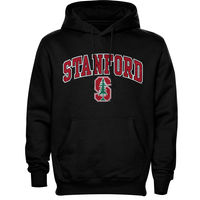During the lull of the off-season, college football coaches often find themselves with a very unfamiliar amenity, free-time. Stanford Head Coach David Shaw decided to spend some of his this week giving an interview on the weekly ESPN podcast Championship Drive. Suffice it to say, his comments on some of the key issues being discussed this offseason made me proud to be a Cardinal fan. Let's take a look at three such issues.
The Playoff
ESPN's Heather Dinich asked Coach Shaw about the difficulty Pac-12 teams face making it into the playoff given the overall strength of the conference. To his credit, he was humble about the fact that they were shut out, despite traversing one of the most difficult schedules in the country.
"I still think the committee got it right... I think the right four teams made it. But I do think it's very difficult. Our strength of our conference from top to bottom, when you combine that with the fact that we play nine out of the twelve teams... I think it's very difficult."
While it's the right thing for a coach to say, it actually didn't have the feel of coach speak to it. I think Coach Shaw recognizes Stanford put it on themselves when they came out completely flat against Northwestern and couldn't overcome rival Oregon. That being said, I still think they were one of the best four teams in the country and would love to have seen them against Alabama or Clemson.
Contact
With the recent focus on concussions in college football and the Ivy League's vote to eliminate full contact practices during the season, much has been said about how much contact is the right amount. While football is a contact sport that demands physicality, there are limits to how much contact can occur safely, and, equally important, how much contact is required to properly learn how to hit and get hit.
"The game is played with contact, and if you practice it without contact, you're practicing bad habits. I'll say this, none of us tackle during the season. While the season's going on, when we get into the fall, nobody tackles anybody. Where tackling is important for me is spring football and training camp, and that's where you teach it. So for us, yeah there's gonna be contact and it's gonna be physical, but there's also going to be the majority of practice which is on skill and instruction."
As someone who has played and coached football, albeit at the high school level, it encourages me to see a balanced answer such as Coach Shaw's. Hitting is important in football. It is just as important to the safety of players to learn how to hit properly as it is not to over tax their bodies with excessive contact, and it seems this fact is often missed in the discussion.
Also enlightening was the fact that Coach Shaw says they don't hit during the season. This is seemingly the equivalent to the Ivy League's new no contact rule, so it will be interesting to see whether this assertion holds true throughout the FBS or if this is solely the approach at Stanford.
Time Commitment
The demands of student athletes are substantial. And while many hold the opinion that balancing school and sports can cause an individual to fail in both, in my experience, it more often helps develop the time management skills that allow students to excel in both. When asked about this balance, Coach Shaw tried to describe the type of environment he fosters at Stanford.
"We're not going to choose one over the other; we want to be great at everything. So, for me as a head coach, I'm gonna allow our guys to come to practice late if they're coming from class, and not give them a hard time about it. I'm going to encourage them with their study sessions... making sure there's an emphasis on doing extremely well in both and if you have to choose between school and football, you choose school."
He goes on to mention that Stanford is a school that has excelled in both academics and on the football field, and certainly the Cardinal can be shown as a model for other institutions. He also noted that if the NCAA wants to get serious about emphasizing academics, rather than attempt to legislate specific requirements across very different institutions, they ought to simply incentivize the end goal - graduation rates.
To me, this is a fantastic idea. Imagine if a school lost scholarships or received post season or recruiting penalties based on graduation rates. This would institute success in academics as a prerequisite for success on the field, thereby incentivizing every coach in the nation to develop both players and students, the way it should be.
I like to think the concept of developing student athletes into better people first and better players second is universal across college football, but the reality is this is unlikely. For each coach concerned about a student's grades, there is probably another trying to help them take a shortcut. For every coach doing their best to teach a player to tackle properly while limiting the amount of stress on his body, there is likely another working a player overtime without regard. And for every Coach that is gracious and humble about his team's success and standings in the new playoff era, there are certainly massive fan bases that believe their team should have made the cut.
But these are just three of many reasons I'm proud to be a Stanford fan, and proud that David Shaw is our Head Coach.








